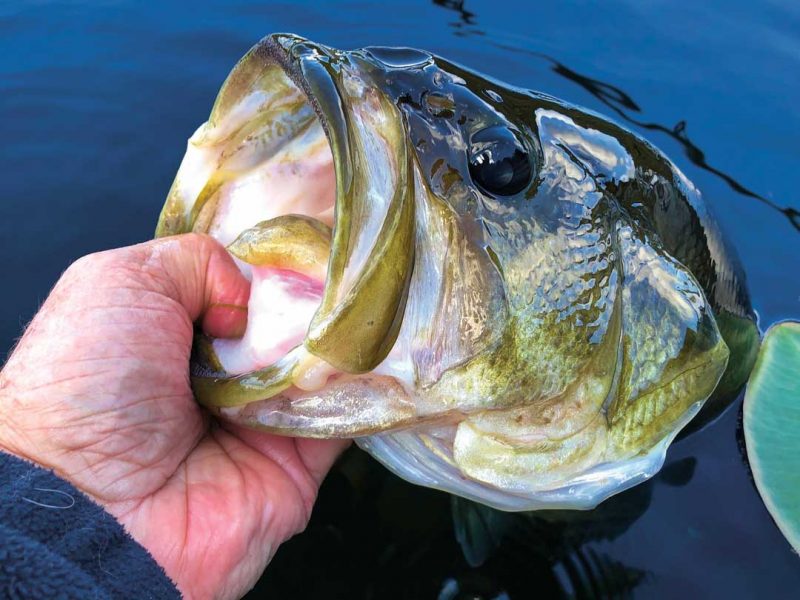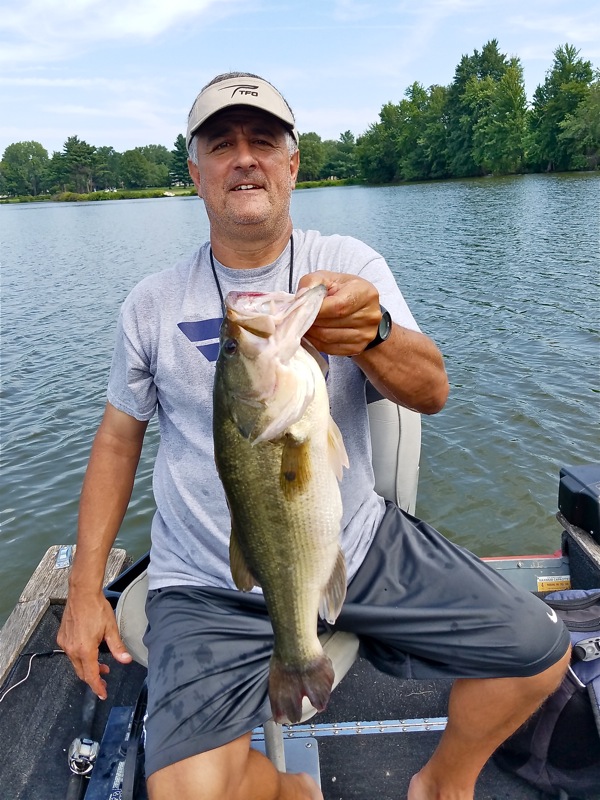
Why waste all that valuable time in the summer? Learn how to catch bass when others say you can’t. (Press Pros Feature Photos)
The best times of the year for bass simply aren’t long enough, leaving four hot, frustrating summer months to scratch the most popular itch in fishing. Want to catch more bass in the summer? Try these simple tricks.
By Ray Reilly for Press Pros
 “Whatcha’ gotta do is fish early, fish slow, and be patient.”
“Whatcha’ gotta do is fish early, fish slow, and be patient.”
That’s what an old man at Lake Okeechobee told me once addressing my question as an inexperienced basser on how to catch bass in the heat of summer.
“Course,” he added. “If you really want to catch fish you come back in November and February,” he added. “Pretty hard in August.”
But it was August, I was there in 1998, with no apparent opportunity to come back – ever – in November or February! I just knew that I was at one of the world’s great fisheries for three days with my family and I wanted to catch some Okeechobee bass.
And for three days I literally whipped Lake Okeechobee into a froth, throwing worms, plugs, and spinning baits from my crude collection of artificial lures. Frustrated, I finally succumbed to bait fishing, at night, and caught a three-pounder from under a dock. Disappointed when I left, you couldn’t prove it by me that Florida was the bass fishing capital of America. I could not make fish bite!
But I quickly learned. And what I learned is these simple facts about why it’s so hard to catch bass in the summer.
One, they’re aggressive fish, but they don’t feed as often in hot weather due to change in their metabolism.
Two, you’re not going to find them up in the water column in warm, summer weather. You’ve got to fish deep, around structure, in cooler water.

Dayton angler Tony Vittorio shows a summer Indiana bass caught…because he knew how. (Press Pros Feature Photos)
Three, if they strike at all it won’t be predictably, as in spring and fall. If they’re not feeding, they may still strike out of instinct if you surprise them. So surprise can be an important element to summer bass fishing.
So, what are the tricks to catching bass when people tell you…you can’t?
One, fish very early in the day, or very late in the evening. When the sun goes down the water quickly cools, which makes fish more active; and I believe, that an absence of light forces them to be more active in order to find food.
Two, fish slowly. Whether you’re using a plastic worm, a top-water lure, or a spinner bait, take your time. There are some excellent Bill Dance videos on YouTube that deal with presentation, and what Bill Dance does will work for you the same as it does for him.
Three, noisy top-water lures, like poppers and frogs, will induce fish to bite out of instinct to protect their territory. They may not be hungry, but bass still have that aggressive nature if they become alarmed.
All of the above is good, but you have to be patient, and you have to know your water. Depth is important in the summer because fish like cooler water during the day. I’ve caught a lot of bass on worms fished slow and down where the fish are, but it takes patience and touch.
But early in the morning and late in the evening is also an excellent time to work the top water with noisy presentations. They will bite because they need to eat, just like you. And no other method is as exciting because can both see, and hear the fish strike. I try to cast toward an object in the water (structure), like brush, pads, or weeds, because that’s where fish ambush their victim. And it’s important to establish a rhythm with your lure, because that repeated action is what eventually attracts a bass to strike.
This is important, too. Cast into the sun if you’re fishing late morning or afternoon. The reason? It not only creates a better silhouette on the surface, but makes your lure appear bigger. It took me a long time to believe it, but it works because it makes it harder for fish to decide if the bait is artificial, or the real thing.
Yes, I love to fish in the spring, or the fall. And one of these days, believe it or not, I’m going to get back to Okeechobee in the winter.
But when you can’t fish at the ideal times, why give up on all those summer months and valuable time wasted – if you don’t know when, and how to catch a bass. Get yourself some baits and go. Poppers, frogs, crank baits, buzz baits, craws – it’s all good once you figure it out.
I’ve enjoyed it.
‘Til next time…!

